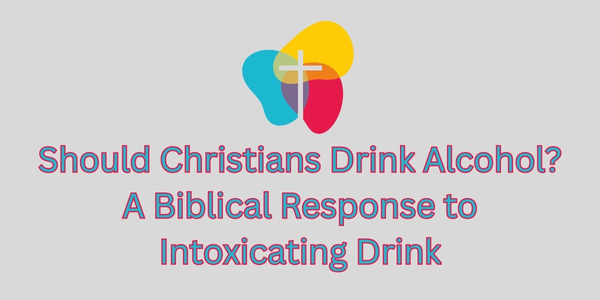“Wine is a mocker, strong drink is raging: and whosoever is deceived thereby is not wise.” — Proverbs 20:1 (KJV)
Alcohol use among Christians is one of the most debated lifestyle topics in the church today. Many believers point to the Bible’s references to wine to defend their use of alcohol. Others choose complete abstinence, citing Scripture’s warnings about drunkenness, temptation, and spiritual compromise.
But to answer the question honestly—Should Christians drink alcohol?—we must go deeper than a verse or two. We must understand what the Bible really says about intoxicating drink, what kind of “wine” Scripture refers to, and how we are called to live as Christ’s ambassadors in a fallen world.
What Does the Bible Say About Alcohol?
Not Always Forbidden
The Bible does not outright forbid drinking wine or fermented beverages. In fact, some verses show it in a positive or neutral light:
- Psalm 104:14–15 (KJV): ”…And wine that maketh glad the heart of man…”
- Ecclesiastes 9:7 (KJV): “Drink thy wine with a merry heart; for God now accepteth thy works.”
- 1 Timothy 5:23 (KJV): “Use a little wine for thy stomach’s sake…”
These verses suggest moderation and specific purposes—like health or celebration.
But Drunkenness is Always Condemned
Throughout Scripture, drunkenness is associated with foolishness, loss of control, sin, and spiritual danger:
- Ephesians 5:18 (KJV): “And be not drunk with wine, wherein is excess; but be filled with the Spirit;”
- Proverbs 23:29–32 (KJV): “Who hath woe?… they that tarry long at the wine… at the last it biteth like a serpent…”
- Galatians 5:19–21 (KJV): ”…drunkenness… they which do such things shall not inherit the kingdom of God.”
The Bible draws a clear line: intoxication is sin. It clouds judgment, weakens testimony, and opens the door to fleshly living.
Biblical Wine vs. Modern Alcohol
One of the biggest misunderstandings in this discussion comes from the assumption that the wine mentioned in the Bible is the same as the strong alcoholic drinks available today. That assumption is simply not true.
Biblical “Wine”:
- The Hebrew and Greek words for wine (yayin, tirosh, oinos) refer to a wide range of grape-based drinks.
- Much of what was called wine in the Bible was fresh juice or lightly fermented.
- Wine was often diluted with water, sometimes up to a 10:1 ratio.
- Drinking undiluted “strong drink” was associated with drunkenness, foolishness, and sin.
“As the new wine is found in the cluster…” — Isaiah 65:8 (KJV)
Modern Alcohol:
- Modern wine contains 12–15% alcohol (or more), much stronger than ancient diluted drinks.
- Hard liquors contain 20–50% alcohol or higher—many times the strength of biblical wine.
- Modern drinking culture often promotes partying, excess, and escapism, all of which contradict biblical holiness.
Using the Bible to justify modern alcohol habits is like comparing apples to fermented, distilled, chemically-enhanced oranges.
The Christian Witness and Alcohol
Even if a Christian believes they can drink moderately, Scripture calls us to consider how our actions affect others:
- Romans 14:21 (KJV): “It is good neither to eat flesh, nor to drink wine… whereby thy brother stumbleth.”
- 1 Corinthians 8:9 (KJV): “But take heed lest by any means this liberty of yours become a stumblingblock…”
As followers of Christ, we are called to live blameless, sober, and holy—not simply free. Our testimony matters. If your use of alcohol causes others to stumble, you are held accountable.
Church Leadership and Abstinence
Scripture gives stricter guidelines for leaders:
- 1 Timothy 3:2–3 (KJV): “A bishop… not given to wine…”
- Titus 1:7: “For a bishop must be blameless… not given to wine…”
- Proverbs 31:4 (KJV): “It is not for kings… to drink wine; lest they forget the law…”
Spiritual leadership requires clear thinking, sound judgment, and personal discipline. These are compromised by alcohol.
A Higher Standard: Glorifying God in All Things
Instead of asking, “Can I drink?”, the Christian should ask:
- Does this honor God?
- Will it damage my witness?
- Will it harm someone else’s faith?
- Am I exercising self-control?
- Am I seeking escape instead of God?
“Whether therefore ye eat, or drink… do all to the glory of God.” — 1 Corinthians 10:31 (KJV)
“Know ye not that your body is the temple of the Holy Ghost…? Therefore glorify God in your body.” — 1 Corinthians 6:19–20 (KJV)
Conclusion: Just Because You Can Doesn’t Mean You Should
The Bible gives room for discernment but never for drunkenness or self-indulgence. In a culture where alcohol is abused, promoted, and even idolized, the Christian is called to stand apart.
If drinking—even in moderation—could lead you or someone else into sin, weaken your witness, or grieve the Holy Spirit… it’s not worth it.
Scripture References (KJV)
- Proverbs 20:1
- Proverbs 23:29–32
- Isaiah 65:8
- 1 Timothy 5:23
- Ephesians 5:18
- Romans 14:21
- 1 Corinthians 10:31
- 1 Corinthians 6:19–20
- Titus 1:7
- 1 Timothy 3:2–3
- Proverbs 31:4–5
- Galatians 5:19–21
- John 2:1–11
